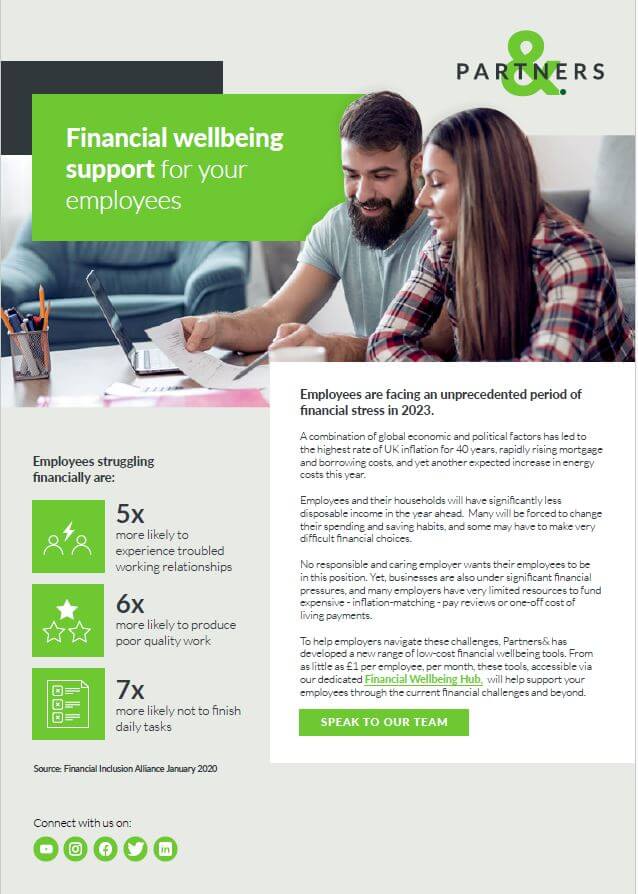What is financial wellness – and why should it matter to you as an employer?
Whilst money might not buy happiness, it can often be the root cause of stress for so many people, affecting an individual’s overall wellbeing and even impacting on performance at work.
With the ongoing economic turbulence resulting in increasing financial burdens, we sat down with Dan Cockram (Partners& Employee Benefits Director) and Craig Pritchard (Senior Corporate IFA consultant at our ecosystem partner, Integrity 365) for a Q&A exploring what can be done from an employer’s perspective and why?
What is financial wellbeing?
Dan Cockram: Financial wellbeing or wellness refers to an individual’s sense of financial security and stability. An employee identifying with positive financial wellbeing would refer to themselves as having good financial understanding and control of their personal finances, with the financial resilience to weather unforeseen circumstances.
Why should an employee’s financial wellness matter to an employer?
Dan Cockram: Factors that can impact your people’s performance can be work-related, however, they are often, if not more so, influenced by a range of more personal challenges. Whilst a seemingly personal topic, financial wellbeing is a key factor to managing and maintaining your employees’ overall wellbeing and productivity, as well as mitigating your organisation’s people risk.
Key stats:
77% of employees experience financial worries that affect productivity
80% of employees look to their employer for sound financial support
66% of working adults would be uncomfortable telling an employer that they feel financial stress
55% of stressed employee were distracted by their money worries and spent more than 3 work hours per week dealing with their personal finances.
Dan Cockram: Research has shown than 53% of businesses report mental health has remained the most common focus of health and wellbeing activity. In stark contrast, just 12% of businesses focus on financial wellbeing. Yet, financial stress is intrinsically linked to overall wellbeing and whilst primarily a problem for employees and their families, poor financial wellbeing has a direct impact on employee performance and productivity.
Therefore, being able to support your employees through financial turbulence can have a positive impact on retention, productivity, and the overall success of your business.
How can you offer financial wellbeing support within your organisation – without personal expertise?
Craig Pritchard: Whilst an employee’s financial situation is very much a personal matter, there are ways you can offer support without needing to be a financial expert or offer advice directly to colleagues. Below are three easy ways any organisation can start the conversation with their team today!
3 great ways to offer your employees financial wellbeing support:
-
Access to guidance
Financial pressure can quickly overwhelm individuals and as the stats above suggest, it is not a topic most are comfortable discussing with their employer. So, providing/ sign-posting financial guidance can be a great place to start!
As a Partners& ecosystem partner, Integrity 365 works closely with the Partners& HR and Employee Benefits teams to provide both their internal team and clients with a series of educational webinars and materials – providing a space for employees to access financial advice on a range of topics from savings and budgeting to debt management and pensions, and giving individuals access to critical advice in a non-invasive, anonymous way. -
Using an Employee Assistance Programme (EAP)
Lots of companies have an EAP in place to provide private counselling/support to employees on a range of matters which typically incudes finances. This can be a good way for a business to offer their employees independent support through an existing benefit that may be in place. For more information about EAPs I recommend reaching out to Dan and the Wellbeing, Health and Protection team at Partners&. You can contact them by phone on 03300940177 or by emailing wellbeing@partnersand.com
-
Workplace pensions and salary sacrifice
All employers operate a workplace pension scheme due to automatic enrolment, but many are not using salary sacrifice. This is a very tax-efficient way of allowing employees to pay into their pension, so they save National Insurance, which reduces the cost of paying into a pension for your employees (as it increases their take-home pay). The benefits don’t end there – as an employer you also save company National Insurance which can be significant, and this can be retained or used towards funding other benefits that will be attractive to your workforce.
Dan Cockram: Financial wellness is often overlooked when it comes to employee benefits and yet it is now more important than ever.
Encouraging such conversations around your benefits will help to create a culture of financial wellness throughout your business. The investment you make as an employer in your employees’ financial wellbeing can be invaluable to your business and the people you employ. Providing support for the overall wellbeing – mental, financial, physical and social is crucial to attract and retain a happy, healthy – and productive workforce.
If you would like to know more about how Partners& or Integrity365 can help, advice on your existing wellbeing programme or more information on financial wellness, we’d be delighted to hear from you.




